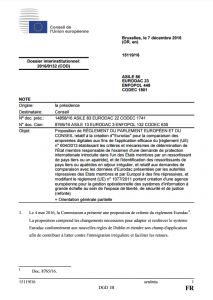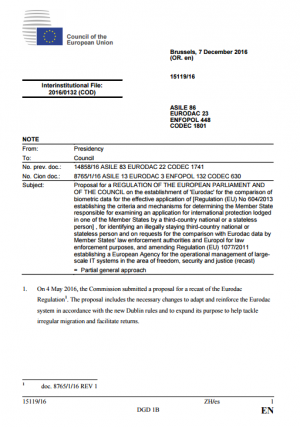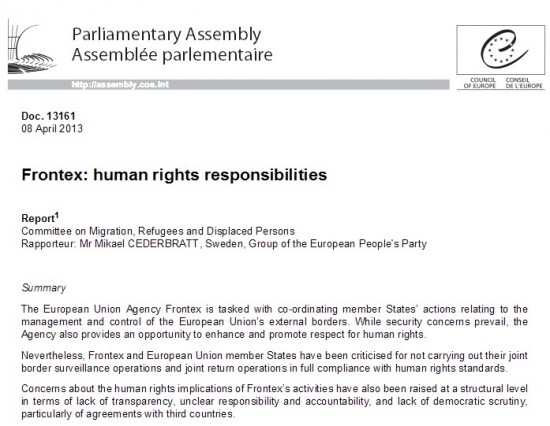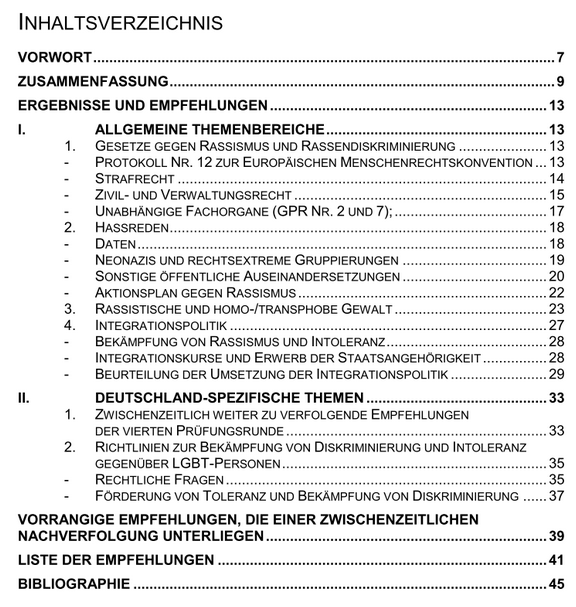 |
 |
A plan for EU Member States to capture or destroy the boats used by people smugglers in the Mediterranean is one of ten possible courses of action that will be considered during the Extraordinary European Council Meeting on the Situation in the Mediterranean that will be held on 23 April.
The boat destruction proposal should be rejected for multiple reasons. There is no basis in law for the proposal and it would endanger lives of innocent people including migrants and fishermen, among others. It would certainly have little effect on its intended target, the people smugglers.
Immigrati, Consiglio d’Europa: „Operazione Triton inadeguata“
L’operazione Triton „non è adeguata“ a prevenire le tragedie dell’immigrazione nel Mediterraneo. Lo afferma Nils Muiznieks, commissario per i diritti umani del Consiglio d’Europa, dopo la nuova „evitabile“ tragedia nel canale di Sicilia. L’Unione europea, continua il commissario dell’istituzione di Strasburgo, ha bisogno di „un efficace sistema di ricerca e soccorso“.
Huffington Post | Nils Muižnieks
„España no puede legalizar lo que es ilegal
La propuesta de legalizar las expulsiones automáticas y colectivas de inmigrantes que llegan a Ceuta y Melilla es injusta e ilegal según el derecho internacional. Tal medida mermaría inevitablemente protecciones fundamentales de los derechos humanos por las que la comunidad internacional ha luchado arduamente desde la Segunda Guerra Mundial. La respuesta adecuada a la afluencia migratoria no es menos protección, sino más protección.
Syrian refugee in Turkey, Bulgaria and Germany – Commissioner Muižnieks
Last December, Commissioner Muižnieks carried out a 5-day visit to Turkey, Bulgaria and Germany on the Syrian refugee crisis. He urged European countries to step up their efforts in providing protection to the more than one million Syrian refugees in Europe.
Link to the video of the visit
Several European countries use of the ATV (airport transit visa) in fighting arrival of Syrians (France, Spain, Germany, Italy, Belgium, Netherland, Greece, Austria, etc.) and at the border between Greece and Turkey, Frontex and border guards of Greece fight also against arrival of Syrians and many others foreigners (see the report of Pro Asyl p.72-73)
Ministers tell Nils Muižnieks, the Council of Europe’s human rights commissioner, that investigations have been launched into claims that Greek coastguard officials ill-treated migrants last year
http://www.enetenglish.gr
Strik’s reaction to L’Espresso article on 11.10 incident:
http://assembly.coe.int/nw/xml/News/
Rapporteur deplores ‘no lessons learned’ on lives lost in the Mediterranean
Strasbourg, 29.11.2013 – “I am shocked to read the results of an investigation into the 11 October boat tragedy in the waters between Lampedusa and Malta, reported in today’s L’Espresso magazine, which reveals that over 200 people fleeing Syria died when they could have been saved,” said Tineke Strik (Netherlands, SOC), rapporteur for the Parliamentary Assembly of the Council of Europe (PACE) on lives lost in the Mediterranean.
Weiterlesen »
Right to leave a country, Issue paper, Human rights commissioner of the Council of Europe, 6/11/2013 (in English):
http://www.coe.int/t/commissioner/source/prems/
EU border control policies negatively affect human rights
Strasbourg, 06/11/2013 – „The EU externalisation of border control policies has a deleterious effect on human rights, in particular the right to leave a country, which is a prerequisite to the enjoyment of other rights – most importantly, the right to seek asylum“, said today Nils Muižnieks, Council of Europe Commissioner for Human Rights, while releasing a research paper on the right to leave a country.
Weiterlesen »

http://assembly.coe.int/ASP/Doc/XrefViewPDF.asp?FileID=19547&Language=EN
PACE will debate on this report on Thursday 25 April 2013 in Strasbourg.
05/04/2013
Migration, Refugees and Displaced Persons
Frontex needs to improve the protection of human rights at European borders
Strasbourg, 05.04.2013 – Adopting the report by Mikael Cederbratt (Sweden, EPP/CD) yesterday in Rabat, the PACE Migration Committee has recommended that Frontex improve respect and protection of human rights at European borders.This European Union agency’s task is to co-ordinate EU member States’ actions relating to the management and control of the EU’s external borders. The committee also called on Frontex to tackle a number of structural issues, including the lack of transparency of its activities, the lack of clarity regarding its responsibility and liability, and the lack of democratic scrutiny of some of its activities, particularly agreements negotiated with third countries.

